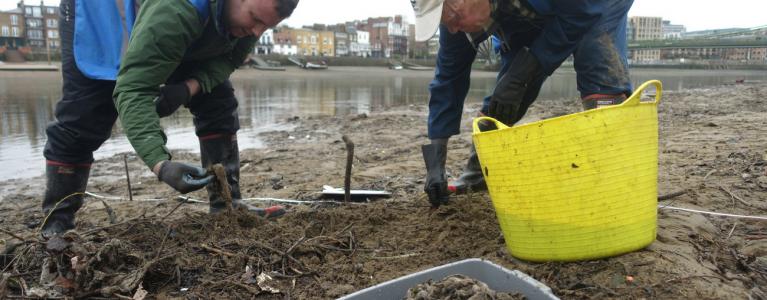
- Thames Water removes 30 tonnes of unflushable material every day from one of its sites.
- It unclogs five house blockages every hour from London’s sewers, a 30 per cent increase from last year.
- Sewage blockages cost Thames Water and ultimately consumers £12 million a year.[2]
- Waste authorities collect more than 100,000 tonnes of nappy waste a year.
- The majority will be sent for incineration, adding to London’s carbon emissions and polluting the air.[3]
- Nappies that go to landfill take around 400 years to disintegrate.[4]
Across the UK, over 11 billion wet wipes, nearly 2.5 billion period products, nearly 4 billion nappies and over a billion incontinence products are purchased every year. These numbers are growing – wipes by over a quarter, and incontinence products by nearly half, compared with five years ago.[5]
There is no legal requirement for manufacturers to list materials on the packaging of products. Tampons contain 5 per cent plastic, period pads contain 90 per cent plastic and nappies contain an estimated 50 per cent plastic and similar materials.[6]
Wet wipes, tampons and period pads are often flushed down the toilet. Londoners are not aware that these items contain plastic and combined with fat and oil create fatbergs and sewage blockages.
The London Assembly Environment Committee report, ‘Single-use plastic: unflushables’ recommends:
- The Mayor and Thames Water introduce a ‘block buster borough’ initiative, to get councils to pledge that unflushables don’t enter the sewage system and reusables are promoted where possible. ‘Bin it, don’t block it’ signage could be displayed on the backs of public toilets.
- The Mayor’s London Healthy Schools initiative should ask schools to demonstrate that they are period positive, in order to reduce stigma and inform children about binning not flushing, and reusable period products as an alternative.
- The Mayor should write to the Secretary of State for Environment, Food and Rural Affairs requesting a statutory format to display proper disposal information and the presence of plastic in products.
- The Greater London Authority (GLA) Group should provide bins in men’s toilets for incontinence and other unflushable single-use products, as currently bins are only in female toilets.
Caroline Russell AM, Chair of the Environment Committee, said:
“Public awareness around single-use plastics, in terms of disposable water bottles and coffee cups is high, but what about other daily products, like wet wipes, nappies and period products? These products end up in our rivers and oceans, sit in landfills or are incinerated, inflicting irreparable damage on our environment.
“We urgently need to educate Londoners not to flush these items down the toilet and enlist the help of the Mayor to take some practical steps to help the situation.
"London has to learn to bin it and not flush it.”
Stephen Pattenden, Waste Network Performance Manager, Thames Water said:
“Many people don’t realise how wipes that get flushed can cause blockages and fatbergs in the sewers. They contain plastic so don’t break down in the same way as toilet paper does, instead clinging to the insides of the pipes and combining with fat and grease to form the fatbergs, which have become so common across London.
“It’s great to have the London Assembly’s help to spread our ‘bin it’ message across the capital.”
Follow us @LondonAssembly and take part in the discussion using #AssemblyEnv and #Unflushables
The report will be launched at the public toilets in Leicester Square. There will be a photo/ filming opportunity with unflushable and flushable products with the Chair of the Environment Committee.
Date: Tuesday 14 August 2018
Time: 10:00am-11:00am
Location: Public toilet (Female), Leicester Square (near the LEGO shop), downstairs entrance
Address: Leicester Square, London, WC2H 0AP (location map)
Closest stations: Leicester Square and Piccadilly Circus
Interviewees:
• Caroline Russell AM, Chair of the Environment Committee
• Stephen Pattenden, Waste Network Performance Manager, Thames Water
• Debbie Leach, Chief Executive Officer, Thames21
MEDIA ARE INVITED TO ATTEND BY PRIOR ARRANGEMENT
Please notify Lisa Lam in advance on 020 7983 4067 or at [email protected]
Related documents
Environment Committee - Single-use plastic: unflushables report
Notes to editors
- The report ‘Single-use plastic: unflushables’ is attached.
- Research supplied by Thames Water
- GLA, London Environment Strategy Evidence Base, and Martin Capstick, North London Waste Authority, at the 23 May 2018 meeting
- Alice Walker, Real Nappies for London, at the 23 May 2018 meeting
- Information from EDANA
- Information from the Women’s Environment Network and Real Nappies for London
- Caroline Russell AM, Chair of the Environment Committee is available for interview. See contact details below.
- Environment Committee
- As well as investigating issues that matter to Londoners, the London Assembly acts as a check and a balance on the Mayor.
For media enquiries, please contact Lisa Lam on 020 7983 4607. For out of hours media enquiries, call 020 7983 4000 and ask for the London Assembly duty press officer. Non-media enquiries should be directed to the Public Liaison Unit on 020 7983 4100.